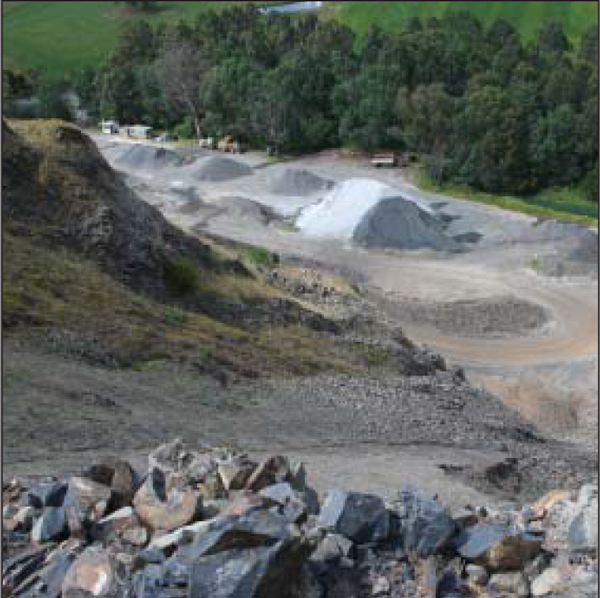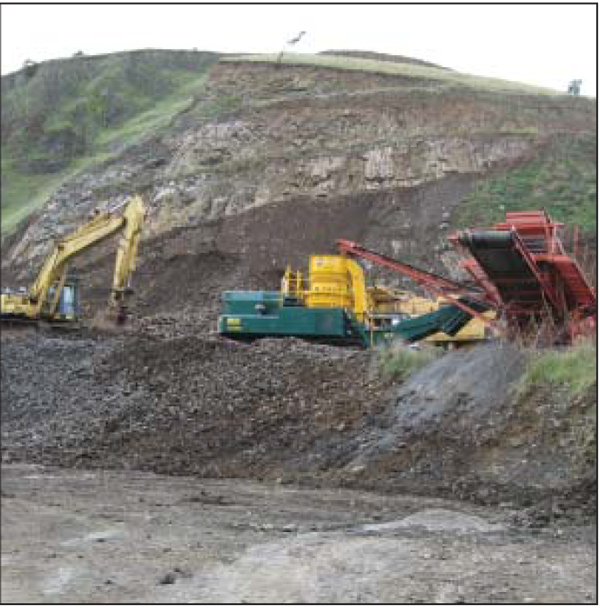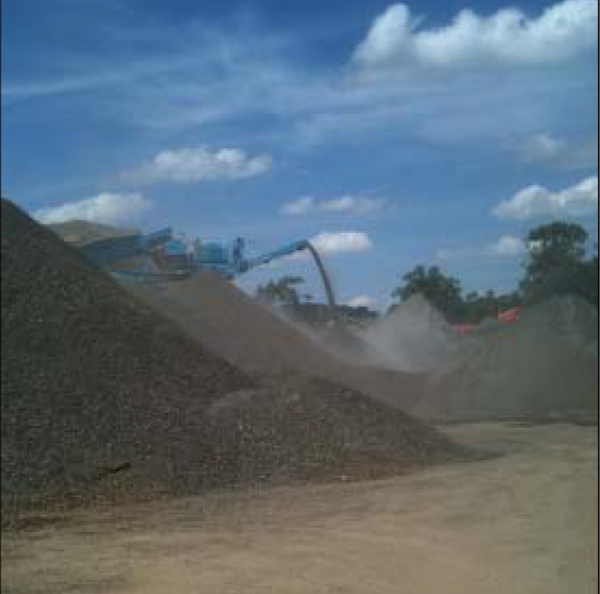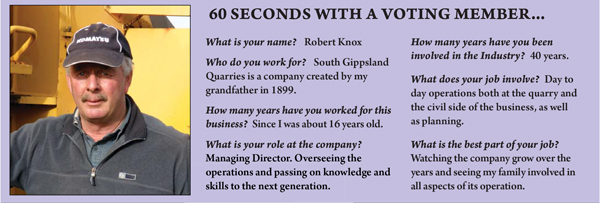South Gippsland Quarries & Robert Knox
There’s few quarry operators in the country that can match the lifelong connection the Knox family has maintained with quarrying in South Gippsland.
WITH over a century of quarrying under their belt, the Knox’s at Leongatha have seen a raft of changes to the way the quarry business operates. From the days of hand drilling and steam driven engines to today’s comfort controlled hi-tech machinery and all the challenges in between.
Rob, Jim and Phil are the third generation to operate out of a small quarry based at Nerrena and like many other small operators across the state; the quarry represents just a fraction of a more widely diversified business.
The Knox family company’s main line of business is civil construction, representing about 75 per cent of the business with quarrying making up the rest.
Much of the quarrying production is also geared to the civil side of the business operations. Managing Director Rob Knox estimates 60% of production heads to external sales.“It’s a handy back up to our civil construction business” he said. “We are set up with a mobile crushing plant to produce road base materials and pug material.”

The family connection with civil construction and quarrying was started by JT Knox, who used mobile steam driven crushing plants to supply materials when he won the contract to stone surface the existing South Gippsland Highway, stretching from Dandenong to Yarram.
A talented engineer with an eye for the terrain he worked his way south identifying suitable sites for extracting the materials required.
JT established a quarry near Leongatha in 1910 and built it up to become the largest operation in Victoria at the time. The remains of one of the three crushers he imported from England, for the now inconceivable sum of £856 pounds, can be found at the quarry today.
The crushing plant was built over the railway siding track to facilitate the loading of rail wagons from overhead hoppers as there was no such thing as large or small wheel loaders.
Once loaded Vic Rail would deliver the wagons to metro Melbourne and beyond where the product was used for concrete aggregate, ballast and road base.
The family has been extracting from the current Nerrena site since 1932, in that time the industry has changed markedly.
In earlier times the restrictions of manual handling dictated how and where the materials could be extracted. The evolution of the machinery involved has made operations much more efficient and has literally changed the face of quarrying. At the same time the demands of compliance issues and regulatory framework has increased at a phenomenal rate.

While the presence of big players nearby would seemingly preclude the business from major expansion, the role of South Gippsland Quarries in the district remains important. For one, it delivers competition, another option for the local construction and building trades.
The Knox’s are also prepared to supply materials such as beaching that can be an inconvenience that for other quarries focused on supplying mainstream products. “Our quarry is also hindered to some extent by not being close enough to the coast, with its subsequent construction growth, nor the Latrobe Valley to the north, so we really are in a sort of agricultural vacuum,” Rob Knox said.
While readily identifying location and nearby competition as a drawback, the quarryman in Rob Knox also recognises that the industry regularly changes. He sees, along with many others in the industry, the quarantining of natural resources by various interested parties as the elephant in the room which might affect the industry sooner rather than later.
Any resource must be mined where it is, not necessarily where you would like it to be. As material gets harder to find and the cost of compliance with the plethora of ‘interested parties’ rises, the general population has to be willing to wear the cost increase due to these issues.
With the fourth generation involved in all aspects of the business, and the fifth generation already practicing their skills in the sandpits at home, it is important to Rob that the company continue to keep up with the shift s in industry demands.
Robert Knox became involved in the CMPA about 12 years ago. A realist, he recognised the importance a strong association can have to a small operator of limited means.

The family have experienced first-hand the many changes to the regulatory frame work over the past century and the impact that Government decisions can make on business operations. Robert understands that “The CMPA is necessary for people like us. With so many levels of governance involved, it is vital to have a representative that can focus on improving the conditions for our business, leaving us to do what we do best.”
“There are a few issues that arise but it’s really about having a common voice for the smaller and medium players, the bigger players have their own voice and the Institute, but that’s not really suitable to us.”
Robert has also found the CMPA a useful sounding board. “I suppose that smaller operations like ours can get fairly passionate and the CMPA is sometimes a good mediator to have to discuss problems before taking them to another level,” he said.
“Another opinion always helps, it gives you that intermediary, a relief valve I suppose and that is good. We didn’t previously have an industry to talk to and perhaps our voice didn’t count. Many people have a misunderstanding of issues and I think that’s probably why the association started because like-minded people need a representative body,” he said.
“I don’t think that the CMPA will run short of purpose and they give us a good standard to work to.”
With initiatives like the transport contract and the training courses, and crushing and screening manuals, it has been very beneficial, according to Rob. “It has become very scientific and when you try to do that yourself there is a cost.”










You must be logged in to post a comment Login